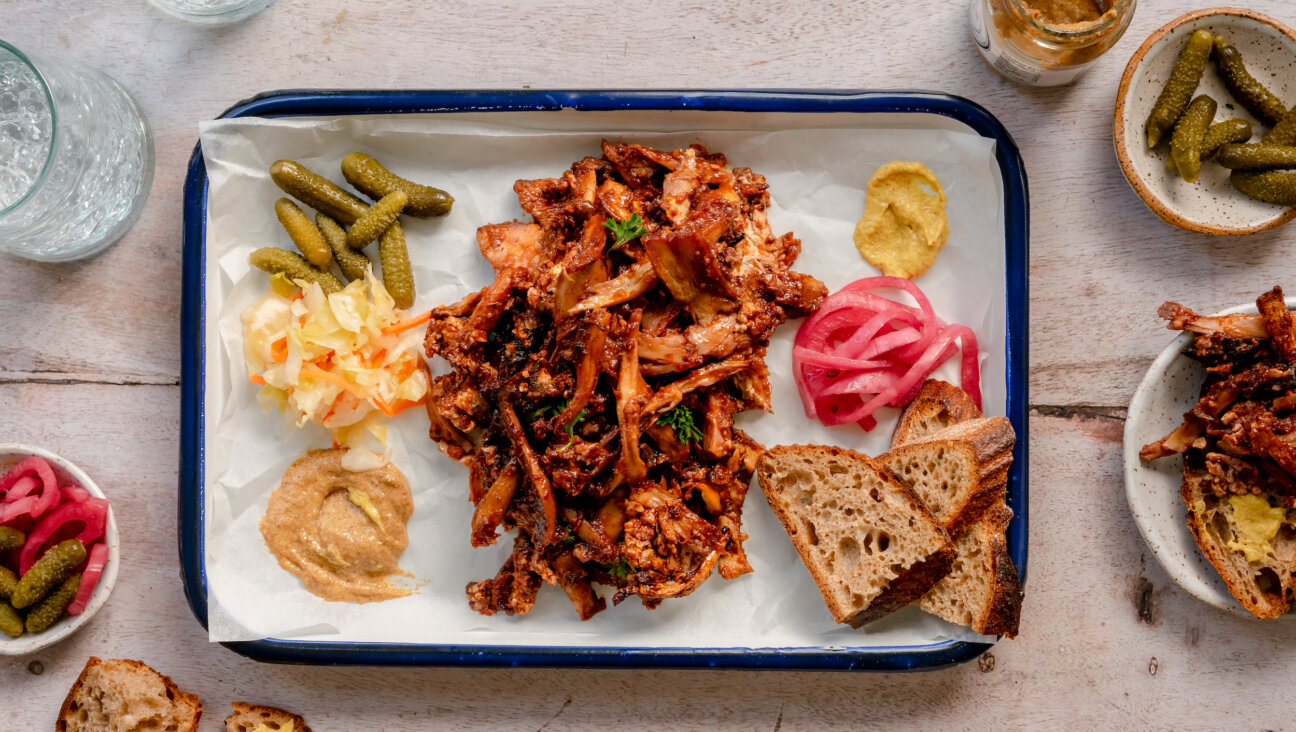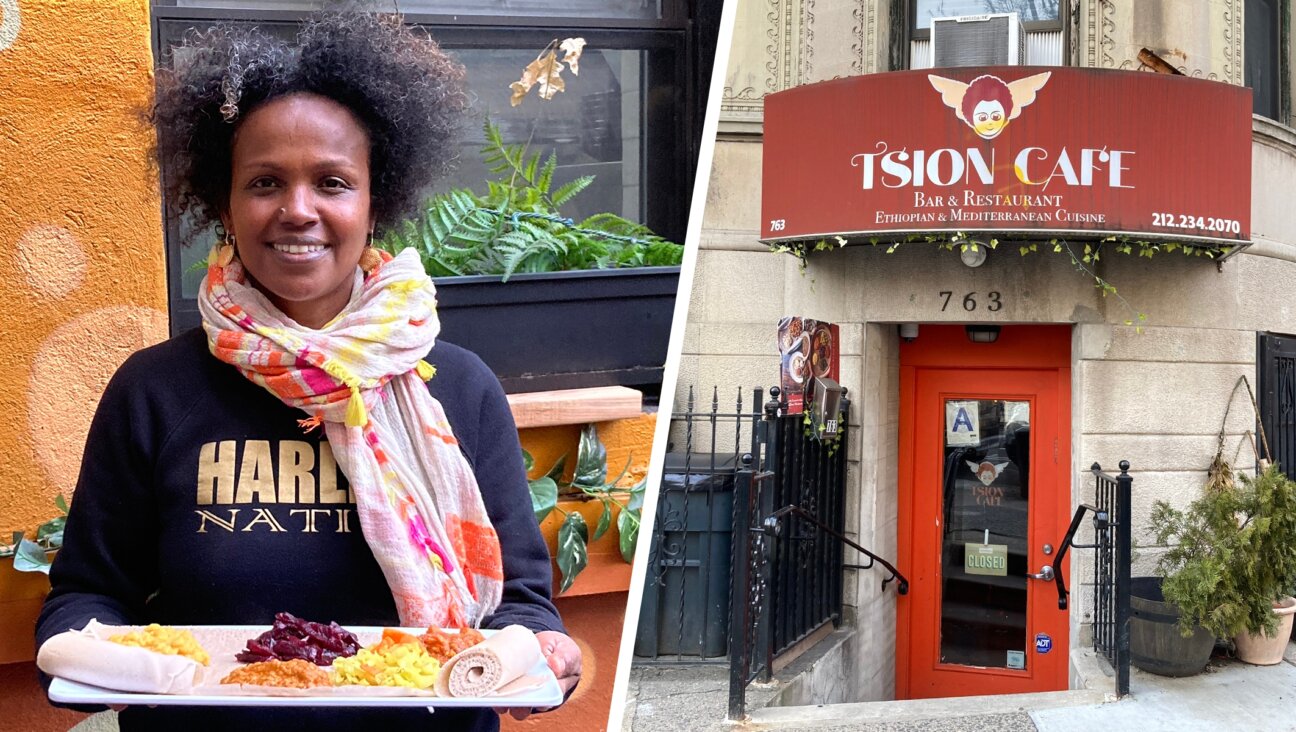Chocolate At Passover? Not So Fast!

Image by Rabbi Deborah R. Prinz
Editor’s Note: Since the publication of this article in April 2017, writer Deborah R. Prinz came across new information. She writes: “While researching updates for the second edition of “On the Chocolate Trail,” specifically about Fair Trade and direct-trade chocolate, I learned that Equal Exchange had suspended its formal Fair Trade certification for chocolate in 2015. It now works through a direct trade arrangement with its farmers.” Prinz is conducting more research for a follow-up article to be published in the Forward this summer.
As I travel around telling stories of Jews and chocolate, some of the folks in my audiences tell me that chocolate is prohibited during Passover. Yet my Facebook friends overwhelmingly agree that chocolate will star in their Passover desserts. Here are some serious questions (and answers) to consider as you make your Passover dessert preparations:
Does Chocolate Come From Beans?
While some people think that cocoa beans are among the prohibited foods of Passover, they are not. Cocoa “beans” aren’t actually beans, which would fall into the category of kitniyot (a group of foods prohibited at Passover among some Ashkenazi sects, which includes rice, beans and legumes). They are seeds from the football-size pods that grow on the cocoa tree. To make people aware of the permissibility of chocolate for Passover, Bartons’ Bonbonniere produced a Passover Haggadah in the 1950s.

That being said, there is another serious consideration to make before eating chocolate at Passover.
What Makes My Chocolate Kosher-For-Passover?

Rabbinic supervision insures that no chametz has entered the product or the equipment after a thorough cleaning of the factory line. That requires chocolate makers to stop production for the kashering process. Ashkenazi rabbis would also prohibit a popular emulsifier (smoothing agent) made from soy beans (kitniyot) called soy lecithin. Sephardi certification permits eating soy in and out of chocolate. The dual food customs observed by Jews of different heritage sometimes result in culture wars around who is able to eat with whom, and which homes may be visited during the Passover week.
In 2016 the Rabbinical Assembly started allowing its adherents to eat kitniyot at Passover. Now Sephardim and Ashkenazim are able to celebrate more easily. And, soy lecithin could be included in Passover’s chocolate.
Isn’t There Another Serious Certification Issue?
Until recently when I shopped for my Passover chocolate, I simply read the ingredients on the label and checked the country of origin of the beans. Since I observe according to Sephardi custom, neither soy lecithin nor kitniyot had been an issue. Of course when buying chocolate to take to a home requiring a Kosher-for-Pesach certification, I would respect that — though I did not generally love the taste of those chocolates.
In examining the labels, I sought to be sure that the chocolate was not only free from leavening, but also not sourced from West Africa. Why? Because I wanted to avoid a child-slavery ingredient in my chocolate.

Passover’s use of food to celebrate freedom from oppressive slavery ideally extends to our chocolate. A 2015 Tulane University study for the U.S. Department of Labor documents that about 12,000 child slaves and over 2 million children do hazardous labor in the cocoa-growing and harvesting industry of Ivory Coast and Ghana. That chocolate should be avoided all year; all the moreso at Passover with its themes of liberation from slavery.
Fair Trade certifiers work to ameliorate the working standards of cocoa farmers. They guard against child slavery and hazardous labor in cocoa growing. Unfortunately, until three years ago, it was not possible to bridge the need for Fair Trade and Kosher-for-Passover certifications in one chocolate.
Have Our Passover-Chocolate Choices Improved At All?
Yes, a bit.
1) In March of 2013, Rabbi Aaron Alexander (Associate Dean, School of Rabbinic Studies, American Jewish University) issued a decision that the soy free, pareve (dairy free) bars produced by a Fair Trade-certified chocolate company, Equal Exchange, could be eaten during Passover by Conservative Jews.
2) The Rabbinical Assembly has included a selection of Equal Exchange chocolate bars on its permitted Passover food list since 2014.
3) For several years, Fair Trade Judaica, T’ruah and Equal Exchange have partnered to further a commitment in the Jewish community to use Fair Trade chocolate during Passover.
It tastes good, too.
This year: One Fair Trade, Kosher-for-Passover chocolate company. Next year: more.
Rabbi Deborah R. Prinz speaks about chocolate and Jews around the world. Her book, “On the Chocolate Trail: A Delicious Adventure Connecting Jews, Religions, History, Travel, Rituals and Recipes to the Magic of Cacao,” (Jewish Lights) is in its third printing. She is co-curator for the Temple Emanu-El Bernard Museum exhibit of “Jews on the Chocolate Trail” to be mounted in the fall of 2017. The book is used in adult study, classroom settings, book clubs and chocolate tastings.





















